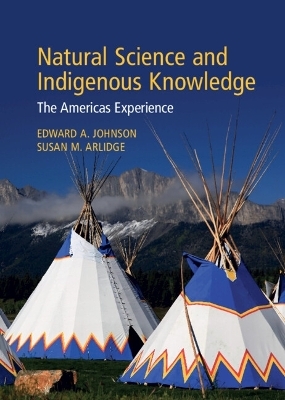
Natural Science and Indigenous Knowledge
Cambridge University Press (Verlag)
978-1-009-41667-2 (ISBN)
How do we combine the areas of intersection between science and indigenous knowledge, but without losing the totality of both? This book's objective is to consider how Indigenous populations have lived and managed the landscape. Specifically, how their footprint was a result of the combination of their empirical knowledge and their culture. The chapters are divided into four groups: The first deals with reintegrating cultures and natural landscapes and the role of kinship and oral tradition. The second group approaches the landscape as a living university of learning and managing, discussing the ethnobotany of how to grow more responsibly, and assess and project the harvest. The third group deals with the managing of fire in an anthropogenic plant community and how to integrate indigenous agriculture in hydrology and dry regions. The fourth group consists of studies of how science and indigenous knowledge can be taught in schools using land-based studies.
Edward A. Johnson is Faculty Professor of Ecology in the Department of Biological Sciences at the University of Calgary. He was Director of the Biogeoscience Institute at the University of Calgary from 1991 to 2017, and from 2003 to 2007 the G8 Legacy Chair in Ecology. His research interests relate to the coupling of physical processes to ecological processes, specifically natural disturbances. He has completed fieldwork in Australia, Canada, Belize, Sri Lanka, Sweden, and the USA. He has published extensively in refereed scientific journals and has authored four books: Fire and Vegetation Dynamics (Cambridge University Press); Forest Fires: Behavior and Ecological Effects (Academic Press); Ecological Education and Environmental Advocacy (Cambridge University Press); and Plant Disturbance Ecology: The Process and the Response, Second Edition (Elsevier Press). He has been part of the Natural Sciences and Engineering Research Council of Canada's Network of Centres of Excellence in Sustainable Forest Management and NSERC-NCEs on GEOIDE and Complex Data Systems, and two NSF networks: the Community Surface Dynamic Modeling System (CSDMS) and National Ecological Observatory Network (NEON). He received the William S. Cooper Award of the Ecological Society of America for research on wildfire effects on boreal forest dynamics. He is a Fellow of the Royal Society of Biology and the Ecological Society of America. He was the Editor-in-Chief of the Bulletin of the Ecological Society of America, editor from 2008 to 2019 and subject editor of Botany, Canadian Journal of Forest Research, Vegetation Science, and Ecology/Ecological Monographs. Susan M. Arlidge has been a certified Alberta teacher, environmental educator, and outdoor guide for over thirty years. She graduated with a BSc (Physical Geography) and a BEd (Secondary) from the University of Calgary and is a trained hiking and snowshoeing guide. Susan was the School Program Consultant at the Biogeoscience Institute at the University of Calgary from 2000 to 2022. Her experience includes heightening student engagement in field science and using novel environments to engage learners and place-based learning in schools. As well as teaching field trips and an extensive list of workshops, she has contributed papers and teacher manuals including, Guiding Students Toward Open Inquiry in a Novel Outdoor Setting, Using the Understanding Science Flowchart to Illustrate and Bring Students' Science Stories to Life, and Five-Minute Field Trips: Teaching About Nature in Your Schoolyard. She has taught and has volunteered extensively with her neighbours, the Stoney Nakoda Nation.
Preface; 1. Introduction: What Do Indigenous People Have to Tell Us about the Cultural Landscapes They Have Created E. A. Johnson and S. M. Arlidge; 2. Reintegrating Cultural and Natural Landscapes: Gunaaxoo Kwáan Tlingit Homelands of the Alsek-Dry Bay Region, Alaska Thomas F. Thornton and Douglas Deur; 3. 'My Uncle Was Resting His Country' – Dene Kinship and Insights into the More Distant Past John W. Ives; 4. Native American Science in a Living Universe: A Paiute Perspective Richard W. Stoffle, Richard Arnold and Kathleen Van Vlack; 5. To Get More Harvest: Natural Systems, Cultural Values, and Indigenous Resource Management in Northwestern North America Nancy Turner and Douglas Deur; 6. Hunting and Trapping in the Americas: The Assessment and Projection of Harvest on Wildlife Populations Taal Levi, Carlos A. Peres and Glenn H. Shepard; 7. On Fire and Water: The Intersection of Wetlands and Burning Strategies in Managing the Anthropogenic Plant Communities Douglas Deur and Rochelle Bloom; 8. Role of Indigenous Knowledge in Public Education Both for Indigenous and Non-indigenous Populations: Natural Science, Social Science and Humanities S. M. Arlidge.
| Erscheinungsdatum | 06.04.2024 |
|---|---|
| Zusatzinfo | Worked examples or Exercises |
| Verlagsort | Cambridge |
| Sprache | englisch |
| Themenwelt | Naturwissenschaften ► Biologie ► Ökologie / Naturschutz |
| ISBN-10 | 1-009-41667-7 / 1009416677 |
| ISBN-13 | 978-1-009-41667-2 / 9781009416672 |
| Zustand | Neuware |
| Haben Sie eine Frage zum Produkt? |
aus dem Bereich


